Fantasia 2018, Day 4, Part 2: Cold Skin and L’Inferno
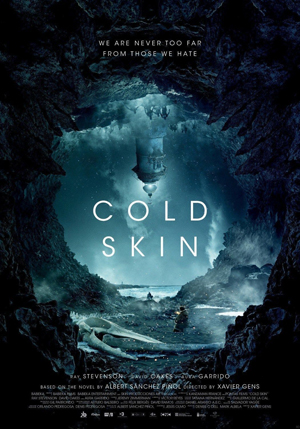 My third movie on Sunday, July 15, was a France-UK co-production called Cold Skin. It was scheduled to start at 5:10 in the Hall Theatre, and ran 107 minutes. At 7:15, across the street at the De Sève, there’d be a showing of the 1911 Italian film L’Inferno, an adaptation of the first part of Dante’s Divine Comedy. Musical accompaniment to the silent film would be provided by Maurizio Guarini of Italian prog band Goblin, well-known for providing the soundtrack to Dario Argento’s Suspiria among many other films. I figured I had a shot at getting in to see L’Inferno, but it’d depend on the length of the line-up. In the meanwhile, I was quite looking forward to Cold Skin.
My third movie on Sunday, July 15, was a France-UK co-production called Cold Skin. It was scheduled to start at 5:10 in the Hall Theatre, and ran 107 minutes. At 7:15, across the street at the De Sève, there’d be a showing of the 1911 Italian film L’Inferno, an adaptation of the first part of Dante’s Divine Comedy. Musical accompaniment to the silent film would be provided by Maurizio Guarini of Italian prog band Goblin, well-known for providing the soundtrack to Dario Argento’s Suspiria among many other films. I figured I had a shot at getting in to see L’Inferno, but it’d depend on the length of the line-up. In the meanwhile, I was quite looking forward to Cold Skin.
Directed by Xavier Gens, the screenplay by Jesús Olmo and Eron Sheehan was based on the Catalan novel La Pell Freda by Albert Sánchez Piñol. It follows an unnamed man (David Oakes), presumably English, eventually to be known as Friend, as he travels by ship to an isolated island in the far south where he will take detailed meteorological readings. It is September 1914, and elsewhere the First World War’s begun; on the island Friend finds, there is no other human inhabitant but a surly lighthouse-keeper named Gruner (Ray Stevenson, perhaps best known for his role as Volstagg in the Thor movies). As Friend soon finds out, though, there are humanoid but non-human inhabitants: fish-creatures that come out at night and attack. Friend finds Gruner keeps a fish-woman (Aura Garrido) as a slave, but must live with him and the creature he names Aneris as, night after night, the other humanoids attack Gruner’s fortified lighthouse.
The first thing that must be said about this film is that it looks spectacular. The landscape of the island is harsh, craggy, barren, and beautiful. Friend’s cabin and Gruner’s lighthouse look lived-in and, crammed with detail, fit their period perfectly. There’s a kind of tactile 1914 that comes out of this movie, particularly the early scenes, before that external world is as it were stripped away from the humans. It’s a realisation of the era that seems to owe nothing to Merchant-Ivory or traditional period films; it’s harder-edged, unyielding. The lighting and cinematography are haunting and perfect: there’s a sense of place to the island built by the quality of sunlight, and a character to the interior scenes (and rare underwater scenes) as the light shifts.
The next thing that has to be said is that the acting in no way takes a back seat to the images. Oakes, Stevenson, and Garrido build complex characters and establish complex relationships among them — relationships that build and change over the course of the film. Garrido’s worth particular mention here, as her character is functionally mute yet always comprehensible. But all three capably bring out the dynamics among the characters that drive the plot, notably the tense not-quite adversarial relationship between Friend and Gruner.
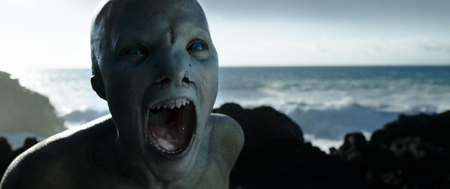 That plot is probably the weakest part of the film. The movie’s paced well, quickly developing an inexorable feel. But it’s fairly simple — Friend and Gruner are under siege, fighting off attacking humanoids night after night, and while Friend wants to try to find a way to make peace Gruner wants to destroy them all. It’s a little difficult to understand how Gruner survived as long as he did, and the way he and Friend go through ammunition stretches credibility (it is mentioned that they have a store of munitions, but the sheer quantity of bullets expended feels unlikely). There’s neither more nor less on the island than what the plot demands; at one point Friend realises that there’s a store of a certain item that might resolve the siege, and that feels less like a logical outgrowth of what we’ve learned than a necessary contrivance to move the story in a certain direction.
That plot is probably the weakest part of the film. The movie’s paced well, quickly developing an inexorable feel. But it’s fairly simple — Friend and Gruner are under siege, fighting off attacking humanoids night after night, and while Friend wants to try to find a way to make peace Gruner wants to destroy them all. It’s a little difficult to understand how Gruner survived as long as he did, and the way he and Friend go through ammunition stretches credibility (it is mentioned that they have a store of munitions, but the sheer quantity of bullets expended feels unlikely). There’s neither more nor less on the island than what the plot demands; at one point Friend realises that there’s a store of a certain item that might resolve the siege, and that feels less like a logical outgrowth of what we’ve learned than a necessary contrivance to move the story in a certain direction.
Still, the writing’s good enough otherwise I’m inclined to ignore the straight-ahead plot. The dialogue’s lovely; speaking of his trip to the island, Friend mentions in voice-over that “the captain always treated me with the courtesy of an executioner,” and the script’s full of such bright little gems. It’s also densely allusive. As representative of European civilisation, Friend in particular brings items and recollections of his culture: copies of Inferno and Stevenson’s works are visible on his shelf, hell and sea-stories. He strikes a pose overlooking the sea like Friedrich’s Wanderer Above the Sea of Fog. He quotes Keats’ “When I have Fears That I May Cease to Be,” a sonnet on impending death. This is a literate film. It begins with the famous quote from Nietszche on gazing into the abyss and the abyss gazing back — but in a movie so deeply concerned with the ocean, ‘the abyss’ gains new meaning, such that the quotation seems to have a new life.
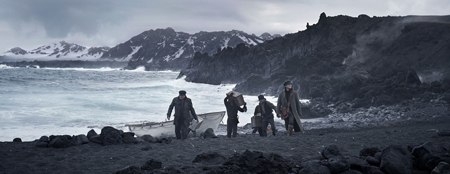 There are so many allusions it’s tempting to see the film as some kind of play with The Tempest, but the characters don’t align terribly well beyond Gruner as a down-at-heels Prospero. Still, if The Tempest is often read these days as a fable about colonialism, there’s no doubt that that’s what Cold Skin is, very consciously and very obviously. It’s a movie about white people coming to an island, enslaving and sexually exploiting one of the inhabitants, and going to war with the others. It’s a movie that questions the nature of civilisation — as Gruner points out, in late 1914 it’s a little hard to view Europe as civilised. But at the same time Gruner writes his name on every part of the island, claiming ownership of the natural world, establishing title to his lighthouse. As the film goes on, the idea of civilisation’s called even further into question, as both Gruner and Friend (the ostensible scientist, there on the island to impose rational measurement on the natural world) seem incapable of observing what ought to be plainly obvious. That’s not a flaw in the film; it’s perfectly clear why they can’t let themselves see a basic fact of their surroundings.
There are so many allusions it’s tempting to see the film as some kind of play with The Tempest, but the characters don’t align terribly well beyond Gruner as a down-at-heels Prospero. Still, if The Tempest is often read these days as a fable about colonialism, there’s no doubt that that’s what Cold Skin is, very consciously and very obviously. It’s a movie about white people coming to an island, enslaving and sexually exploiting one of the inhabitants, and going to war with the others. It’s a movie that questions the nature of civilisation — as Gruner points out, in late 1914 it’s a little hard to view Europe as civilised. But at the same time Gruner writes his name on every part of the island, claiming ownership of the natural world, establishing title to his lighthouse. As the film goes on, the idea of civilisation’s called even further into question, as both Gruner and Friend (the ostensible scientist, there on the island to impose rational measurement on the natural world) seem incapable of observing what ought to be plainly obvious. That’s not a flaw in the film; it’s perfectly clear why they can’t let themselves see a basic fact of their surroundings.
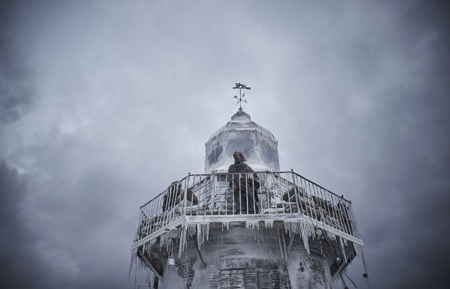 For all the movie’s knowingness about colonialism, though, I think much of its power comes from the fact that it can’t be easily summed up as a mere allegory. That’s what makes a story work, I think; when it does more than one thing, when it can’t be neatly diagrammed. That’s the case with Cold Skin, to me. There’s a weirdness under the surface that I don’t know how to identify. Even the metaphor “under the surface” hints at the oceanic imagery of the film: there’s something going on in the subconscious deeps of the movie, perhaps. Identity here shifts, is mutable. The Tarot, a pack of images upon which magical beliefs have been projected, makes an appearance: the Tower struck by lightning, an apparent allusion to Gruner’s lighthouse. “What we know is a small island in the vast ocean of what we don’t,” we’re told at one point. It’s true, and points to what makes the film work: the mystery, the connections the viewer’s led to make without being aware of making them.
For all the movie’s knowingness about colonialism, though, I think much of its power comes from the fact that it can’t be easily summed up as a mere allegory. That’s what makes a story work, I think; when it does more than one thing, when it can’t be neatly diagrammed. That’s the case with Cold Skin, to me. There’s a weirdness under the surface that I don’t know how to identify. Even the metaphor “under the surface” hints at the oceanic imagery of the film: there’s something going on in the subconscious deeps of the movie, perhaps. Identity here shifts, is mutable. The Tarot, a pack of images upon which magical beliefs have been projected, makes an appearance: the Tower struck by lightning, an apparent allusion to Gruner’s lighthouse. “What we know is a small island in the vast ocean of what we don’t,” we’re told at one point. It’s true, and points to what makes the film work: the mystery, the connections the viewer’s led to make without being aware of making them.
From Cold Skin I hurried across the street. There are two lines for Fantasia films, one for regular ticket-holders, one for media. Each theatre keeps a certain number of seats aside for media; once those seats get filled, anybody left in the media line has to wait for the ticket-holders to be admitted. If there are seats left over at that point — because the show wasn’t sold out, or because some people with tickets couldn’t make it — more media will be let in to fill up the theatre. That’s what happened to me. In the end, I was one of the last people to make it in, sitting on a plastic folding chair near the door, to one side of me my friend Thomas O’Connor of Goombastomp, to the other side of me (I was later informed) an actor who’d had a minor supporting role in Ant-Man. You never know what’ll happen at Fantasia, I suppose.
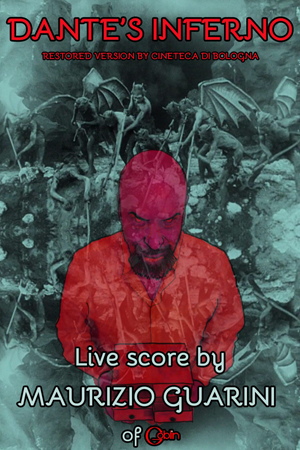 I’m not going to write too much about the 1911 L’Inferno here. I don’t need to; you can see it for yourself at the Internet Archive. I will say that it’s an inventive and wondrous film, directed by Francesco Bertolini, Adolfo Padovan, and Giuseppe de Liguoro. Salvatore Pappa is Dante, the poet, lost in a dark wood at the midpoint of his life and threatened by three ferocious animals only to be saved and guided by the shade of the great poet Virgilio (Arturo Pirovano) through the depths of hell and beyond.
I’m not going to write too much about the 1911 L’Inferno here. I don’t need to; you can see it for yourself at the Internet Archive. I will say that it’s an inventive and wondrous film, directed by Francesco Bertolini, Adolfo Padovan, and Giuseppe de Liguoro. Salvatore Pappa is Dante, the poet, lost in a dark wood at the midpoint of his life and threatened by three ferocious animals only to be saved and guided by the shade of the great poet Virgilio (Arturo Pirovano) through the depths of hell and beyond.
(I will say a couple things, though. I specifically want to stress that this is a spectacular film, using all kinds of techniques to get across a sense of Hell using 1911 film technology — double exposures, forced perspective, elaborate costumes, whatever it takes. And at the same time, it’s fascinating because of the traditional approach to the material; not only was this movie made before the creation of most of the film language we’re used to, it was also made before modernism had really been established. Not just a relic of its age, it’s a lively survival into this one.)
But what intrigued me about this showing was the music that would be provided by Maurizio Guarini. He gave a brief introduction before the film, noting that he was touring with it around North America. He observed that L’Inferno was “supposed to be a silent film; I hope I don’t ruin it.” And then the show began.
Guarini’s score was on the whole meditative, even pensive, which fits with the mood of the Divine Comedy, or one aspect of it: Dante on a great voyage, struggling to understand what he sees around him, despairing and elated by turns. It was possible to pick out elements of Guarini’s previous work — I could hear passages similar to his work on the Suspiria soundtrack when Dante and Virgilio reached the wood of suicides — but in any event it built nicely. I imagine there must have been a temptation to rely on a heavy organ music through the film, but Guarini showed admirable restraint in beginning with gentler, almost mellotron-like sounds only to reach a hymnlike organ by the end of the film. The music swelled and receded throughout the movie, accompanying scenes among the wrathful with heavy drums, at other times interjecting surprising electronic sounds. Occasionally it seemed that Guarini was slow to match a cut in the film from one scene to another, but more often his choices made sense — as when the first glimpse of the enormous figure of Satan in the background was met with distorted synthesizer sounds.
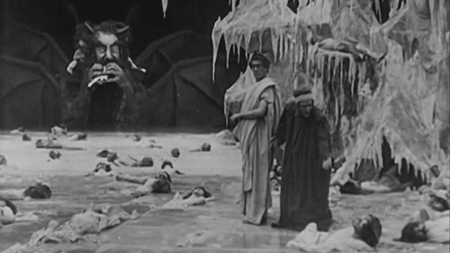 The overall effect of music and images was striking. Guarini was not afraid to use modern sounds, rather than constantly try to replicate physical instruments on his keyboards. In general this worked. I thought the score was also on the whole understated, both avoiding displays of virtuosity and maintaining an overall mid-tempo feel (with some variations, usually slowing for a particular scene). The effect was to create a trance-like state, perfect for following the images unspooling, literally unreeling, there before our eyes. It’s not just that the viewer was brought into the film, but that the hallucinatory aspect of the film, its daring and strangeness, were intensified.
The overall effect of music and images was striking. Guarini was not afraid to use modern sounds, rather than constantly try to replicate physical instruments on his keyboards. In general this worked. I thought the score was also on the whole understated, both avoiding displays of virtuosity and maintaining an overall mid-tempo feel (with some variations, usually slowing for a particular scene). The effect was to create a trance-like state, perfect for following the images unspooling, literally unreeling, there before our eyes. It’s not just that the viewer was brought into the film, but that the hallucinatory aspect of the film, its daring and strangeness, were intensified.
The audience must have been affected. They gave Guarini a standing ovation. I could understand why. The music in itself was fine. As accompaniment to L’Inferno, it brought out the weirdness of what we saw. Textually, the film’s a reasonably faithful adaptation of Dante’s Inferno; visually, it’s spectacle, but spectacle given a haunting quality by the passage of time. Everyone who appears onscreen in the movie is now dead. And in the movie they play, all but one of them, dead or demonic spirits. Only they come back to life as we watch, and they are silent, Guarini’s music both an imagining of what they might feel and a way into the world they are creating: the world of monochrome ghosts gliding over the screen of the movie theatre.
Find the rest of my Fantasia coverage here!
Matthew David Surridge is the author of “The Word of Azrael,” from Black Gate 14. You can buy his first collection of essays, looking at some fantasy novels of the twenty-first century, here. His second collection, looking at some fantasy from the twentieth century, is here. You can find him on Facebook, or follow his Twitter account, Fell_Gard.
That “Ant-Man” actor you sat next to was probably David Dastmalchian. He played the brother of “Relaxer”‘s protagonist (Joshua Burge, who won the Best Actor award at Fantasia for his performance.)
Now if only the actress who played the aqua-woman in “Cold Skin” (Aura Garrido) had one Best Actress, I’d have fewer complaints about the jury choices at this year’s Festival.
That is to say, “…had WON Best Actress…”
Too much time away from a real keyboard.
I believe you’re right about Dastmalchian. He was a guest at the festival.
I’m kind of torn about Garrido as Best Actress. She was excellent, and would have been a worthy winner, but Kim Da-mi was great in The Witch as well. Helena Howard in Madeline’s Madeline was also incredible. (I’m not sure which films were eligible for awards, though, so there’s that.)